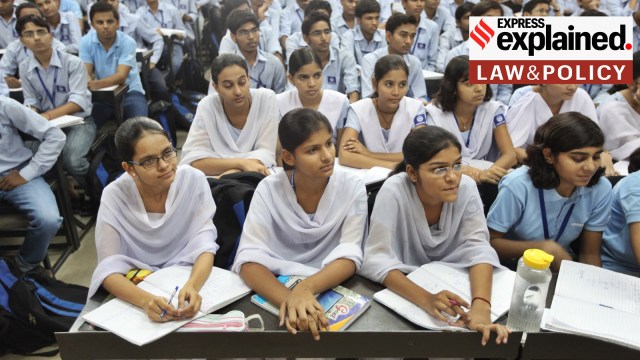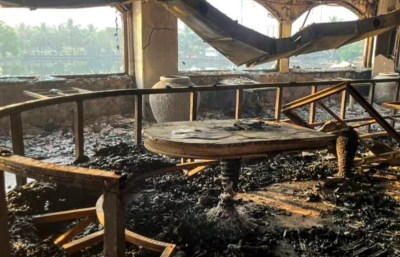What Rajasthan’s coaching centre Bill says, why it matters so much
The Bill is described as “a decisive step to curb the commercialization of coaching institutes and [to] ensure that they operate within a framework prioritizing the well-being and success of students”.
 Over the years, the Rajasthan HC commissioned a study into student stress by Tata Institute of Social Sciences, issued guidelines, set up a committee, and pushed for the formulation of legislation. (Express file photo by Tashi Tobgyal)
Over the years, the Rajasthan HC commissioned a study into student stress by Tata Institute of Social Sciences, issued guidelines, set up a committee, and pushed for the formulation of legislation. (Express file photo by Tashi Tobgyal)The Rajasthan Assembly this week passed a Bill to regulate the coaching centre industry in the state, and to “create a healthier and more supportive environment” for students to pursue “their academic and professional goals”. However, it has also faced criticism from Opposition leaders. Here is what to know.
Purpose and context
The Rajasthan Coaching Centres (Control and Regulation) Bill, 2025, passed on September 3, makes provisions for the registration, control, and regulation of coaching centres, and to determine the minimum standards and requirements for their registration.
It seeks to “take care of interests of students [in coaching centres] and provide them career guidance and psychological counselling for mental well-being,… take appropriate measures to provide security and reduce [their] stress…and…[ensure their] holistic development…in preparation of different competitive examinations…”.
The Bill is described as “a decisive step to curb the commercialization of coaching institutes and [to] ensure that they operate within a framework prioritizing the well-being and success of students”.
 Hoardings of various coaching centres in Kota, Rajasthan. (Express file photo by Tashi Tobgyal)
Hoardings of various coaching centres in Kota, Rajasthan. (Express file photo by Tashi Tobgyal)
Deputy Chief Minister and Higher Education Minister Prem Chand Bairwa said 88 coaching-centre students had died by suicide in the last four years, including 70 in Kota, the “coaching capital” of India, and 14 in Sikar.
Rajasthan High Court took suo motu cognizance of student suicides almost 10 years ago, after 19 students were reported to have taken their lives in coaching centres in 2015. “In the past five years, about 78 students…have committed suicide… No one has been held accountable,” the court said on January 4, 2016.
Over the years, the HC commissioned a study into student stress by Tata Institute of Social Sciences, issued guidelines, set up a committee, and pushed for the formulation of legislation.
In its report submitted in March 2025, the Department-related Parliamentary Standing Committee on Education, Women, Children, Youth and Sports, noted “the lack of a regulatory framework at the national level to regulate the proliferating coaching centre industry”, and the “widespread reports of financial fraud in these coaching centres, as well as instances of student suicide, drug abuse, and mental health struggles”.
Provisions of the Bill
The proposed law will be enforced by a Rajasthan Coaching Centres (Control and Regulation) Authority, which will have senior Education and police officials, a psychiatrist, and representatives of coaching centres and parents’ bodies.
Committees at the district level will have the district magistrate, superintendent of police, and chief medical and health officer among their members. The district authority will ensure the registration of coaching centres and their compliance with the law, and the setting up of grievance redressal cells.
The district committees will also oversee various aspects of the functioning of the coaching centres, including the way in which fees are charged, complaints are dealt with, and teaching is carried out.
Coaching centres are required to apply for registration within three months of the Act coming into force. Eligibility conditions include having a physical area of not less than 1 sq metre per student, engaging tutors with at least a graduate degree, and not making “misleading promises or guarantee of rank or good marks”.
|
THE COACHING INDUSTRY SIGNIFICANT IMPACT on state economy, especially in Kota and Sikar. Rajendra Pareek, Congress MLA from Sikar, has claimed that 30-35% of Sikar’s economy is dependent on coaching centres. 50 LAKH STUDENTS are enrolled in coaching centres in the state, the business is estimated at Rs 60,000 crore, and extends direct and indirect support to 10 lakh people, according to MLAs in the Assembly. |
They must have a system of counselling, a website with updated details including the qualifications of tutors, hostel facilities, policy on fees, and data on success rates. Students and teachers must have weekly days off, and coaching must not exceed five hours in a day.
Violations will attract fines of Rs 50,000 in the first instance, and Rs 2 lakh for a second offence. Subsequent violations could lead to a cancellation of registration. In an earlier version of the Bill, penalties for the first and second violations were Rs 2 lakh and Rs 5 lakh respectively.
The proposed law will cover coaching centres with more than 100 students; the previous version of the Bill was applicable to centres with 50 students.
Criticism of provisions
During the Assembly debate on the Bill in March, deviations from the “Guidelines for Regulation of Coaching Centres”, published by the Union Ministry of Education in January 2024, were flagged. These included the requirement that “no coaching centre shall enroll a student below the age of 16 years”.
Other criticisms of the Bill included its alleged failure to adequately address the problem of suicides and its officials-heavy nature that could promote red-tapism and inspector raj. There were apprehensions that the Bill would adversely impact smaller coaching centres, and force coaching centres out of the state, adversely impacting the economy of Kota.
Amid the opposition, including by MLAs from the ruling party, the Bill was sent to a Select Committee of the House. The Committee, which presented its report on September 1, made just two changes – reducing the penalty, increasing the size of the centres to which the proposed law would apply.
On September 3, Opposition MLAs criticised these changes, and alleged that the Bill appears intended to protect coaching institutes rather than students. They repeated the criticism that the Bill does not do enough to address the increase in suicides, and fails to make psychological or career counselling mandatory. They again flagged the disregarding of the central guidelines.
In the government’s defence, Minister Bairwa said that the intention was to ensure “balance and justice”, and that coaching centres were not “unnecessarily” burdened.
- 01
- 02
- 03
- 04
- 05






































